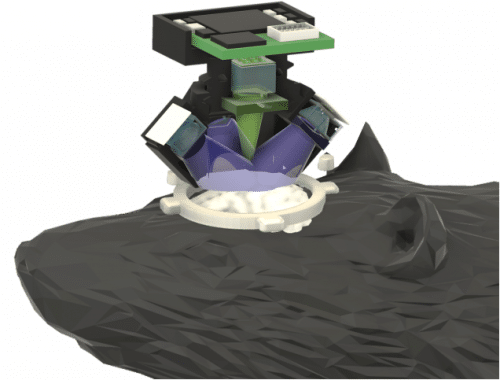Boston University Assistant Professor Lei Tian has been working on the Computational Miniature Mesoscope (CM2), a “wearable” tiny brain imaging device with Professors David A. Boas and Ian G. Davison.

One challenge with present technology is that imaging devices are still too bulky and heavy for small animals like mice to wear while capturing their cerebral activity in real time. Wearability is a key feature of CM2, since it will allow scientists to monitor neural activities on freely moving mice. For this to work, the device must be incredibly light, weighing no more than 4 gram.

Depending on the activity of the brain, tens of thousands of neurons fire in unique patterns across the cortex of the mouse. The goal of the study is to get a full picture of brain activity over the entire mouse cortex while keeping single-neuron resolution. Miniature optics and advanced computer methods are used in this technology to achieve innovative capabilities that go beyond what is now available.
The gadget uses an array of microlenses inspired by insect eyes to offer a full-cortex, high-resolution view of the cortex and enables 3D imaging to account for cortical curvature, allowing imaging across different spatial scales. “Typically, these are competing factors,” says Tian. “Images either have a high resolution or a wide field of view. We’re using the computational imaging approach to overcome these tradeoffs.”
The CM2 will record calcium dynamics as fluorescence intensities emitted from transgenic mice’s brains. Tian’s concept hinges on the use of high-efficiency LED light to activate the fluorescence. The CM2 has a unique design that uses an LED array and 3D-printed freeform optics to efficiently trigger fluorescence throughout the entire cortical surface.
Tian was recently awarded a $2 million grant from the National Institutes of Health to advance the development of CM2. “With this R01 grant, we want to take CM2 from a proof-of-concept prototype to a more mature technology so that it can be broadly impactful and adopted in the neuroscience community,” says Tian.







